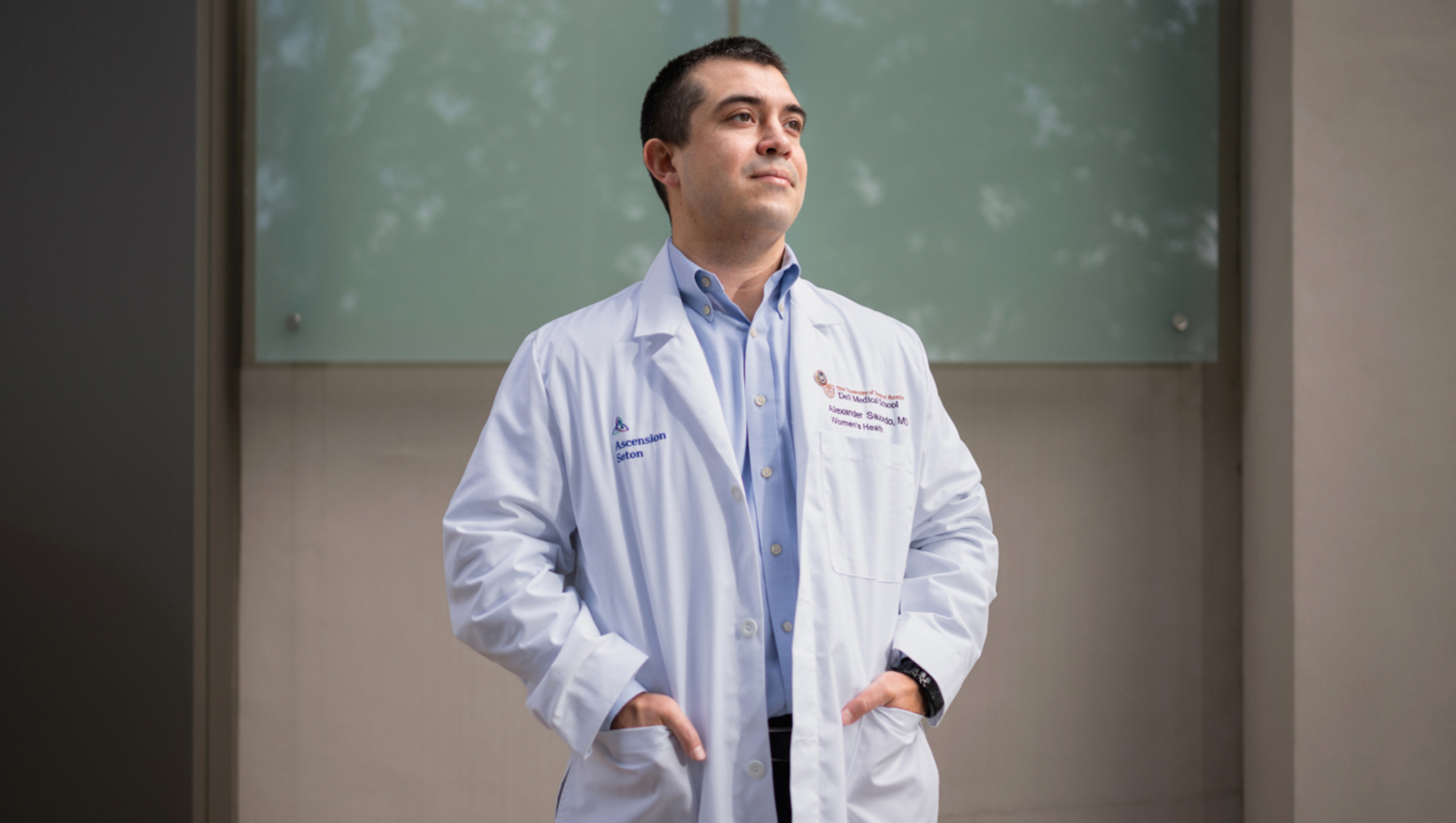Most medical literature regarding labor and delivery management focuses on low-risk patients, leaving physicians to adapt research for high-risk patients who require specialized care the most.
Enter Alex Saucedo, M.D., a recent graduate of Dell Medical School’s maternal-fetal medicine fellowship. In an effort to fill the gaps in available research for pregnant patients requiring complex care, Saucedo conducted the first-ever clinical trial at Ascension Seton Medical Center Austin’s labor and delivery department and recently won the Ken Shine Excellence in Research by a Postdoctoral Clinical Trainee Award, paving the way for safer deliveries and better care for high-risk pregnancies.

Alex Saucedo, M.D.
Q&A With Saucedo:
What inspired you to pursue this field?
I have a strong passion for caring for patients with high-risk pregnancies, surgical obstetrics and operative delivery, and academic mentoring of trainees. I strive to provide a full spectrum of equitable reproductive health care to all patient backgrounds, especially patients within underserved communities.
Having trained in multiple high-volume academic centers across Texas puts me in a unique position to understand the most common conditions affecting patients in major urban Texas cities and identify the barriers our patients most commonly face. I have used my experiences in these institutions to understand the breadth of labor and delivery practices across the state and how these practices translate into patient outcomes.
For example: professional societies like the American College of Obstetricians and Gynecologists and Society for Maternal-Fetal Medicine have published recommendations on common labor management strategies. However, these guidelines are vague and based on primarily low-risk, term, singleton pregnancies. Texas faces an increasing number of high-risk pregnancies complicated by increased medical morbidities such as obesity, cardiac disease, hypertensive disorders, diabetes and higher-order, or repeat, cesarean deliveries.
A large gap in literature exists within the labor management of high-risk pregnancies, and providers are left to extrapolate the recommended standard of care for high-risk pregnancies, which face much different challenges in their labor management. This is where my experience at UT has tremendously supported me into the investigation of these pregnancies and labor management strategies.
How has this gap defined your research?
In the first-ever clinical trial performed at the Ascension Seton Medical Center Austin labor and delivery unit, I fully constructed a double-blinded pharmacologic randomized controlled trial examining induction medication dosing in patients with obesity.
Patients with obesity face an increased risk for lengthy labor inductions, which result in an increased risk for cesarean deliveries, hemorrhage and more adverse outcomes. Again, our current guidelines do not specify what is optimal labor management of patients with obesity, so this trial offered novel information to the literature describing how higher doses of an induction medication may be beneficial in reducing time in labor. It is my hope that this trial will spur future multicenter work evaluating similar high-risk pregnancies and optimal strategies into their labor management to further reduce adverse maternal and neonatal outcomes.
This was all made possible by the world-class research mentorship I received under the guidance of Lorie Harper, M.D., Alison Cahill, M.D., MSCI, and George Macones, M.D., MSCE, as well as coordination between our increasingly robust research department and the Health Transformation Research Institute.
Is there a memory that has impacted the trajectory of your work?
I had one particularly busy day on labor and delivery during my residency training. There was a plethora of deliveries occurring at a rate of almost two per hour. Between a set of normal deliveries, a patient came in with no prenatal care experiencing an acute placental abruption with subsequent massive hemorrhage. This patient also was found to have an abnormal adherent placenta consistent with placenta accreta spectrum, a condition where the placenta attaches too deeply to the uterus. Ultimately, she received a massive transfusion protocol with over 30 blood products transfused, and delivery of her fetus was followed by complete hysterectomy and admission to our intensive care unit. Immediately after we completed her surgery, I went into an adjacent delivery room and performed yet another normal vaginal delivery with an ecstatic set of parents and family members.
To me, that experience encompasses the field of obstetrics and high-risk pregnancies. We are a full-spectrum field, and we have the privilege to experience the ultimate highs in a patient’s life as well as some of the lowest points in a family’s timeline. Very few fields in medicine get to experience patients who are actually excited and look forward to making their appointments. Additionally, very few fields in medicine get the privilege of taking care of two patients simultaneously, both maternal and fetal, having to balance the risk and benefits of each decision. I never take for granted being able to care for both the happy, low-risk patients in addition to the medically complex maternal and fetal conditions.
Graduate medical education, or GME, refers to the period of education in a particular specialty or subspecialty following completion of medical school. This continuation of training through residency and fellowship programs provides the clinical and educational experience needed for physicians to achieve autonomy, deliver high-quality patient care, and prepare for challenges in an evolving health care landscape.
Dell Med serves as the academic home and Ascension Seton as the clinical home for 494 resident and fellow physicians within more than 45 residency and fellowship programs ranging from family medicine and neurology to pediatric emergency medicine and cardiovascular disease.